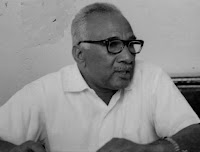محمد حمد ساتي (شيخ العلماء السودانيين)

Dr Mohamed Hamad Satti (1910-2005) has been a prominent member of the medical profession in Sudan for over half a century. His extensive contributions to medicine in general, and tropical medicine field and laboratory work specifically, deserve respect and admiration.
Dr Satti started research and teaching in the most important tropical diseases soon after his becoming a medical officer in Singa. Ever since, he had been at the forefront of tropical medicine in Sudan and elsewhere in the world. He was a Founder Member of the National Health Laboratories, Institute of Medical Laboratory Technology, School of Laboratory Assistants, and he was the one who supported and engineered advanced training for laboratory technicians in Sudan.
He was a founder member of the school for Tropical Medicine and a hospital (1966), and the Institute for Tropical Diseases Research. He envisioned and proposed the establishment of the Medical Research Council and the National Council for Research. Due to this early call and to other opportune moves by other scientists, the NCR was established in 1970 with a power to form many specialized councils including the MRC. Dr Satti was senior researcher and consultant in this council throughout his life.
Dr Satti was appointed as Director Stack Medical Research Laboratories in 1963. He remained a very active researcher in this laboratory right up to his late years. From 1940 to 1999, Dr Satti developed international links in tropical diseases with healthcare professionals across the world, and commanded respect from all his peers and associates.
In 1985, in recognition of his genuine contributions to tropical medicine, the WHO awarded him the Sousha prize and medal, the University of Khartoum awarded him the Honourary Doctor of Science in 1980, and in 1989, the Supreme Council of State in Sudan bestowed upon him Wisam El-Nilain, and the highest award in the country.
Dr Satti was greatly respected within his principal specialty of pathology, medical zoology, and microbiology; he was also vice-chairman of the WHO Onchocerciasis Expert Committee in 1986.
Dr Satti played a leading role in promoting both field work as well as laboratory sciences in Sudan. Dr Satti introduced and promoted interest in new disciplines like medical entomology, malacology, and vertebrate ecology. Until few years before his death in 2005, he continued to teach, on a voluntary basis, on tropical diseases in the Faculty of Medicine, University of Khartoum. From 1940 until 1985, Dr Satti authored over 60 most illuminating scientific publications and wrote several reports on tropical medicine in international refereed journals along with other co-workers.
The name of Dr Satti was familiar to the tropical medicine community worldwide. He accumulated several achievements that affected significantly many disciplines.

Comments